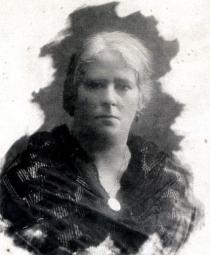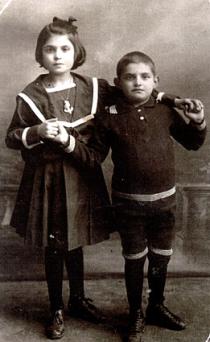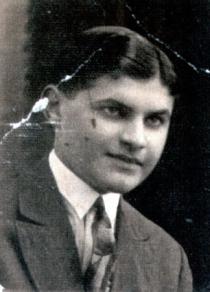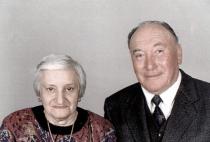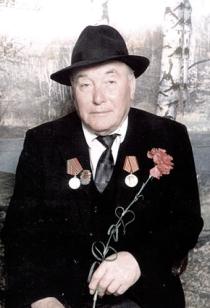This is me Vladimir Khalfin and my wife Silva Khalfina, née Shelak, at our silver wedding - 25 years of life together. She is a nice person and we've lived our life in love and consent. The photo was taken in Chernovtsy in 1980.
In 1946 I became an apprentice of a worker at the shoe factory and then worked sometime at the mechanic plant in Chernovtsy. 1947-48 were hard years. Food sold at the market was far too expensive. After working I studied at the lower secondary evening school to get secondary education. After finishing this school I studied to make shoes. I couldn't afford to continue education. I worked at a shoemaker shop for over 50 years. There were 10 other Jewish employees. I never faced any anti-Semitism at work. I was a skilled employee and my clients treated me with respect.
I never took any interest in politics. Somehow I didn't quite like the institution of this state since it only created problems for people. I didn't even try to find a better job or to get promotion since I didn't believe in anything. I didn't believe that a decent person could have a decent life in this country and I knew that I couldn't lie to take advantage of things, so why try? I lived a quiet life and I didn't become rich, but I went to bed with clear conscience and didn't trade my principles. Other people that had higher position were worried about it and had to face intrigues and lies, but since I was just a shoemaker there were no problems that I might possibly have in this respect.
I found my wife through a matchmaker, an old Jewish 75-year old woman. She came to my mother and offered her to introduce me to a nice girl. My mother told me about it and I gave my consent. The matchmaker took me to my future wife's family. My wife Silva Shelak was born in Mogilyov-Podolskiy on 2 March 1928. Her father Gersh Shelak was a shoemaker and her mother Ida Shelak was a housewife. Silva had a younger brother Jacob, born in 1932. Her father was deaf, but he was recruited to the front anyway when the Great Patriotic War began. Silva, her mother and brother were in the ghetto in Mogilyov-Podolskiy during the war. In 1942 Silva's mother died in the ghetto during an epidemic of typhoid. I cannot imagine how two orphan children survived in the ghetto. They stayed in Mogilyov-Podolskiy until their father returned from the front in 1945. They moved to Chernovtsy where Silva finished a lower secondary school and an accounting course. The years spent in the ghetto had their impact on her health - she was weak and sickly. Her brother was also sickly and died at 40.
We got married in 1955. We had a civil ceremony and a small dinner for relatives and friends where we sang Jewish songs and danced. I moved into my wife's apartment, she stayed at home after we got married. She was too weak to go to work. Our daughter Ida, named after Silva's mother, was born in 1955. Later we began to call her Ludmila, which is a Russian name. She finished a secondary school and Business College. She married a nice Jewish man Evgeny Smoliansky, who also studied at the Business College with her. They moved to Kerch in the Crimea. She calls us from there and spends her vacations with us, sometimes with the husband and the kid, sometimes alone.
My wife and I observed Jewish traditions however difficult it was at different times. During the Soviet times there was an underground Jewish bakery where they made matzah for Pesach. We brought flour there at night and the following night we could pick bags with matzah. It was a problem to buy necessary food products for celebration. One had to stand in line for hours to buy chicken, but we celebrated our holidays anyway. We always gathered with the siblings and our mother. We also celebrated Soviet holidays and the happiest of them was Victory Day on 9 May. In the morning my wife and I went to the parade where we met our friends.We got together with them for a party on such holidays. My wife had prepared food for the party. We talked and sang Jewish songs, shared our memories about the wartime and were happy to have survived.
When Jews began to move to Israel in 1970s we couldn't go: my wife was confined to bed. Of course, if it hadn't been for my wife's illness we would have gone to Israel. Our daughter wanted to go to Israel, but she was reluctant to leave us on our own. I would love to visit Israel and hope I will get a chance to go there. It's a happy person who can say that he has had freedom to do what he wanted. I haven't had an opportunity to spend my vacation elsewhere in 20 years. I couldn't leave my wife. She has cancer in the last stage and all I can do now is just try to relieve her pain, if possible. Since she didn't work due to her illnesses she received a pension of 35 rubles [Editor's note: 35 rubles is less than $7]. Only in the last 3 years she has received allowances paid to former inmates of ghettos by Germany. We are grateful to those that remember people that suffered from fascism.

